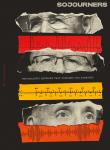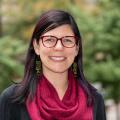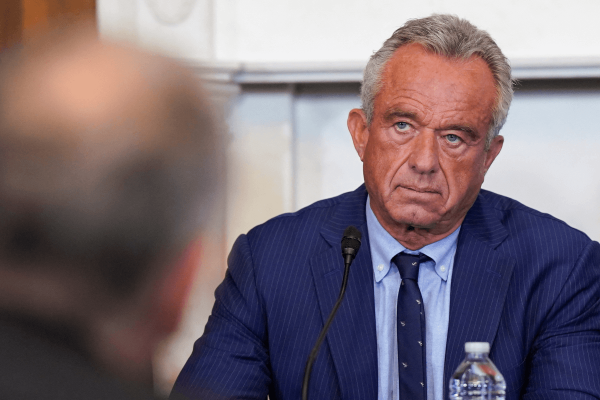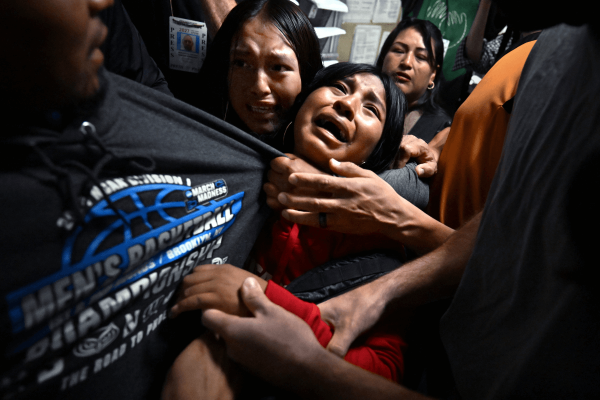THE HOLY SPIRIT has a starring role leading up to Pentecost, not only on the day itself. Jesus prepares the apostles to receive “another Advocate.” Other readings jump forward to what occurs when disciples are filled with the Holy Spirit. This could be an unusual level of holiness meant for a few, but it sounds like a holiness to which we can all aspire. Stephen and the apostles were granted heavenly visions or the ability to speak new languages. The challenge for believers today is to recognize when the Spirit of truth “comes upon” us.
A clue might be found in how Jesus describes the approach of the Holy Spirit to the disciples (Acts 1:8): This verb (eperchomai) conveys the sense of moving from a transcendent position toward one who is less powerful. The writer of Luke-Acts also uses the verb in this way when Gabriel answers Mary’s question about how it could be that she will bear the Messiah.
Mary, the apostles, Stephen, and others weren’t powerful to begin with. It is the Spirit who empowered them, who made risky discipleship possible. And the “signs and wonders” (Acts 5:12) that flow from being full of the Spirit aren’t always spectacular. We could be filled with the Spirit when we turn a vacant lot into a community garden. Or when we register new voters. Or furnish a home for a family seeking asylum. We don’t need a certain level of education, status, or holiness to live into Jesus’ promise that his followers can receive power to do great works (John 14:12).
May 3
Churches ‘Heal’ Debt
Acts 2:42-47; Psalm 23; 1 Peter 2:19-25; John 10:1-10
AMID “SIGNS AND wonders” by the apostles, Acts 2 describes how early Jesus followers provided for each other by selling off possessions and goods, praying together, sharing meals, and holding property in common. That may seem an impossible ideal.
But sharing resources beyond our individual household can be creative while supporting communal stability and security. The early Christians intertwined worship with economic relationships and forged bonds of community. Congregations can do this in diverse ways.
Several Chicago-area congregations have helped to raise money for canceling medical debt through a nonprofit organization called RIP Medical Debt. RIP uses the same method as debt collectors—it buys debt in bulk from brokers at a deep discount—except RIP then collects donations to clear the debt. Individual contributions as small as 50 cents or a dollar from people in the pews together wiped out thousands of dollars of medical debt, freeing a family. Members of the participating congregations rejoiced in worship that they could relieve financial stress, even while many of them also had such debt.
In my Anabaptist tradition, economic sharing includes the practice of “mutual aid.” Community members contribute to a fund and make disbursements from it when a person or household reveals a need that they can’t meet alone. We all have times of lean and plenty. We are all part of the same Shepherd’s flock.
May 10
Nurture Curiosity
Acts 7:55-60; Psalm 31:1-5, 15-16; 1 Peter 2:2-10; John 14:1-14
WHEN WE BECOME part of something larger than ourselves, a tension may arise. It’s not easy to follow 1 Peter’s encouragement: “Like living stones, let yourselves be built into a spiritual house, to be a holy priesthood, to offer spiritual sacrifices acceptable to God through Jesus Christ” (1 Peter 2:4-5). In this epistle, the images for the life of discipleship are communal images, yet they point to the value of each individual person. If we see each one as a building block that holds up the whole, as priests capable of conveying God’s presence, then we can’t discount anyone. Churches committed to social justice and solidarity are not exempt from failing to see the way the Spirit is filling each person. Even when limits are removed on who can serve in specific roles, arrogance and superiority may still hold sway.
In The Age of Overwhelm, Laura van Dernoot Lipsky suggests that activists nurture curiosity and look for what others can teach us, instead of believing there’s only one right way to do something.“Our individual desire to witness results is often not a crucial part of the collective process of creating meaningful change,” she writes. When we accurately see our part in the whole, then we can become like “living stones” building up a spiritual house.
May 17
Slippery Hope
Acts 17:22-31; Psalm 66:8-20; 1 Peter 3:13-22; John 14:15-21
“ALWAYS BE READY to make your defense to anyone who demands from you an accounting for the hope that is in you.” Some hear this passage (1 Peter 3:15) as a call to give confession of faith, a lecture in apologetics, or to evangelize. Yet “the hope that is in you” is more slippery than these responses; it’s tougher to grasp and whip out in a moment.
I grew up in activist circles and became a journalist as a young adult. These communities perennially ask: Where do you find hope? Lately, my hope is refined and reshaped by the suffering I witness—including that of parents separated from their children. Perhaps similar circumstances prompted the psalmist to name God’s testing: “You have tried us, O God, refining us, as one refines silver” (Psalm 66:10).
Slowly, I learn not to draw hope from success, especially in efforts for peace and justice. Victories deserve celebration, yes. But hope needs a deeper source. Catholic priest Henri Nouwen wrote, “Being neither an optimist nor a pessimist, Jesus speaks about hope that is not based on chances that things will get better or worse. His hope is built upon the promise that, whatever happens, God will stay with us at all times, in all places.” Jesus promises that the Advocate, the Spirit of truth, will be with the disciples forever (John 14:16). This is a hope to hold on to, even if only by a thread.
May 24
No Matter the Cost
Acts 1:6-14; Psalm 68:1-10, 32-35; 1 Peter 4:12-14, 5:6-11; John 17:1-11
I SPENT FIVE years as a global religion news editor. Scanning headlines each week demonstrated that no faith system was exempt from having some adherents who persecute those of another faith. Hindus and Buddhists oppress Muslims. Muslims attack Christians. Christians open fire on Jewish people at prayer.
Some U.S. Christians jockey for public attention by positioning themselves as persecuted, “undergoing the same kind of sufferings” (1 Peter 5:9) as Christians in other parts of the world. Do we try to distinguish among claims of persecution?
Persecution was part of the context of the church’s first few centuries. And it has been a crucial element in Christian history. “Persecution is necessary in the church,” Salvadoran Archbishop Oscar Romero preached in 1977, “because the truth is always persecuted.” The church does not seek persecution, but always seeks the truth.
Whether believers are persecuted by others or not, we are united in closeness with the suffering Christ. In 1 Peter 4:13 we are invited to “rejoice insofar as you are sharing Christ’s sufferings.” But the opposite is also true: Christ shares in our sufferings. In John 17, Jesus prays that his followers may be one, as Christ is one with God. Jesus has knitted us together into one body, sharing the Spirit who has known all that Jesus endured in the flesh and who strengthens us in our discipleship, no matter the costs.
May 31
Embracing Enemies
Acts 2:1-21; Psalm 104:24-35b; 1 Corinthians 12:3-13; John 20:19-23
AFTER THE APOSTLES receive the Spirit on Pentecost, a crowd of “devout Jews from every nation under heaven” gathers (Acts 2:5). Scholars note that this language emphasizes “the universal character of the Pentecost event,” and that’s true. But something else stands out as I place the map of nations in Acts 2 alongside a current world map. Pentecost was witnessed by the ancestors of people in several nations with which the U.S. has had tensions or open conflict in the past decade. The locations “beyond Judea” (and Judea itself) are today’s Israel and Palestine. Mesopotamia is Iraq. In “Egypt and the parts of Libya belonging to Cyrene,” militant groups that are offshoots of ones the U.S. has battled continue to operate. “Parthians, Medes, and Elamites” would now be Iranians.
Being filled with the Spirit grants the apostles fluency in languages they couldn’t speak before—and allows diverse listeners to understand. It’s difficult to imagine the barriers that divide us today torn down and replaced by understanding. The apostles might not have envisioned it either. Though the risen Christ had breathed the Spirit into them and told them they would receive power to become gospel witnesses to the ends of the earth, the apostles weren’t fully convinced or prepared. They couldn’t have fully known what they would be capable of after the Holy Spirit moved toward them, came upon them, filling the less powerful with power.

Got something to say about what you're reading? We value your feedback!






